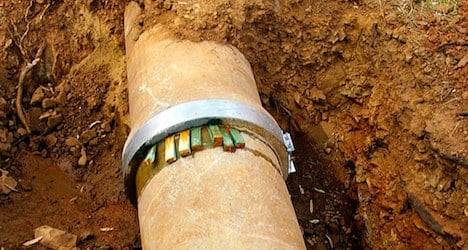The report, aired on Monday by state TV broadcaster RTS, showed that an average of 14 percent of tap water disappears in the ground because of aging or faulty pipes.
That works out to 4,000 litres of water lost every second to leaks or 127 million cubic metres a year, according to national estimates, the broadcaster said.
In the canton of Jura, as much as 40 percent of drinking water is lost because of ageing pipes that have not been replaced due to lack of investments.
“We should really recognize that a generation has ‘profited’ from other investments rather than putting to one side (money) to make the replacement investments when appropriate,” Jacques Gerber, head of the canton’s environment service, told RTS.
Nationally, officials say not enough is being done to replace worn-out water mains.
“We consider that the average life of a water main is 60 years, so all the oldest pipes should be changed but that is far from always being the case,” Philippe Collet, an official with the Swiss association for water and gas industries.
Municipalities are responsible for maintaining the infrastructure but it is often not a priority for elected officials, Collet told RTS.
Some cantons, such as Bern, have made it more difficult by limiting the amount that municipalities can set aside for reserves and their capacity to raise water rates, the broadcaster said.
Meanwhile, MPs in Bern approved on Monday an annual tax of up to nine francs ($11) for each household linked to a water treatment plant to fund new equipment to screen out “micro-pollutants”.
These pollutants, such as medicines, hormones or biocidal compounds, are only partially removed from Swiss treatment plants.
The tax will finance the installation of equipment in 100 plants across the country.


 Please whitelist us to continue reading.
Please whitelist us to continue reading.
Member comments